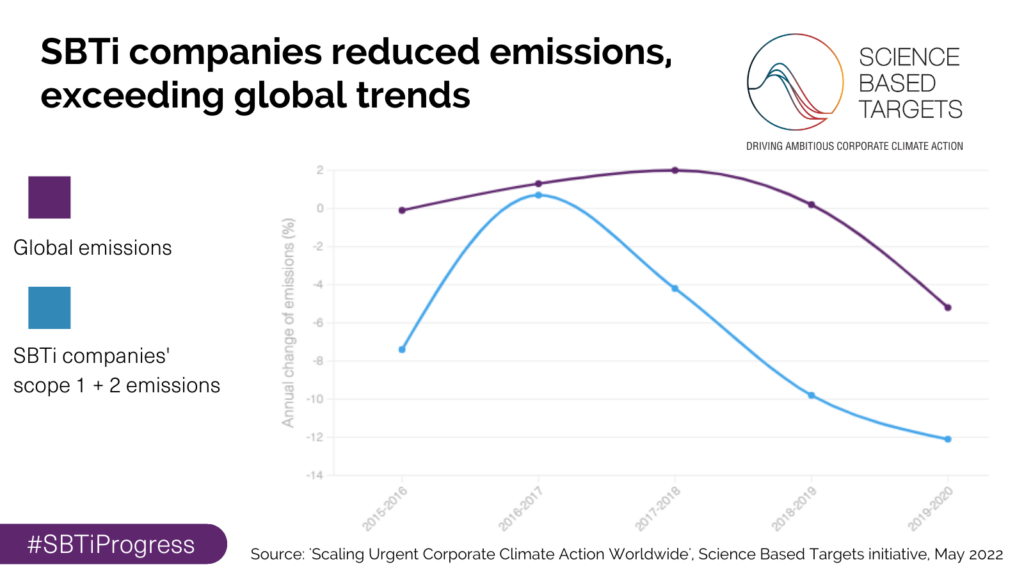Governments take note: science-based targets lead to faster emissions cuts, the right policy can cut them faster still
Maria Mendiluce, CEO, We Mean Business Coalition
The latest progress report from the Science Based Targets initiative (SBTi) shows that record numbers of companies are working towards science-based targets (SBTs) to cut their emissions.
Given our long history with the SBTi, the We Mean Business Coalition applauds its growth to become the de facto gold standard for corporate emissions reduction targets. The initiative has grown exponentially since the first pioneers set targets back in 2015. According to the report, 2,253 companies with a combined market cap of one third of the global economy – a total of $38trn – are now working with the SBTi.
This is important because, as the report details, companies with approved science-based targets are cutting their emissions faster. In 2020, COVID19 caused a decrease in emissions of 5% globally, whereas companies with science based targets cut their emissions by 12%. The report also shows that companies with approved science based targets reduced their scope 1 and 2 emissions (that is, emissions coming from operations and energy use) by 29% in total between 2015 and 2020.

Source: ‘Scaling Urgent Corporate Climate Action Worldwide’, Science Based Targets initiative, May 2022
G7 – and indeed all governments – should take note. Setting targets aligned with science works. If public and private sector could collaborate and align on emissions reduction ambition by ensuring Nationally Determined Contributions (NDCs) are also at the level required to halve global emissions by 2030 then we still have a chance of achieving this goal.
For policymakers, the ambition and level of progress in SBTi companies must also inspire greater climate action. There is a clear correlation between SBTi progress and country progress on climate. Companies with targets cover an impressive global spread of 70 countries. Of these, Europe is leading with 46% of high-impact companies having set or committed to science-based targets in 2021. This is unsurprising since the EU has shown climate ambition in its own policy settling and through the implementation of the Green New Deal, which aims to make Europe the first climate neutral continent in the world. Some Member States are going even further, such as Sweden which has set a 2045 net zero target. This is why We Mean Business was created, to move the ambition loop into action: progressive climate policies spur companies to take action, and growing business momentum sends a strong signal to governments to be more ambitious on climate.
The growth of companies voluntarily signing up to the targets also sends a signal other businesses that setting targets makes business sense. As companies reduce their emissions their climate credentials make them more attractive to consumers, their reduced energy and material consumption reduces their costs, and their performance attracts more talent.
With the upcoming ISSB standard and new regulatory reporting requirements in the EU and US, reporting on climate action is set to become mandatory. Companies that are voluntarily transforming their businesses to achieve the emissions reductions required by SBTi will have a head start, as we move from thousands of companies with science based targets to the millions.
So now governments should consider two things. How can they create a policy landscape that makes it a legal requirement for all companies to set targets? What will they do to enable companies who have set science-based targets to cut their emissions faster?
In light of the energy crisis now intersecting with the climate crisis, a just transition to clean energy has to be at the top of policymakers’ agendas. Science makes clear that to stabilize the climate and secure a livable future for all, we must rapidly phase out fossil fuels and replace them with a clean energy system. The good news is that a rapid transition will also help companies achieve their science-based targets faster.
Scaling up renewables, electrification of energy uses and increased energy efficiency are the key pillars of achieving this transition away from fossil fuels. By implementing policies now governments will not only increase energy security, they will also enable businesses with science-based targets to access clean energy across their value chains. This will give a huge boost to companies’ efforts to decarbonize their value chains and enable them to meet their targets faster.
The G7 coming up in June is a critical moment for climate action by the most advanced economies on our journey to halving global emissions by 2030. With 55% of SBTi companies headquartered in G7 countries, we urge G7 leaders to take note of the progress companies are voluntarily making on emissions reductions. Support them – and indeed all business – to build on this and drive the innovations and transformations our economies so urgently need.

